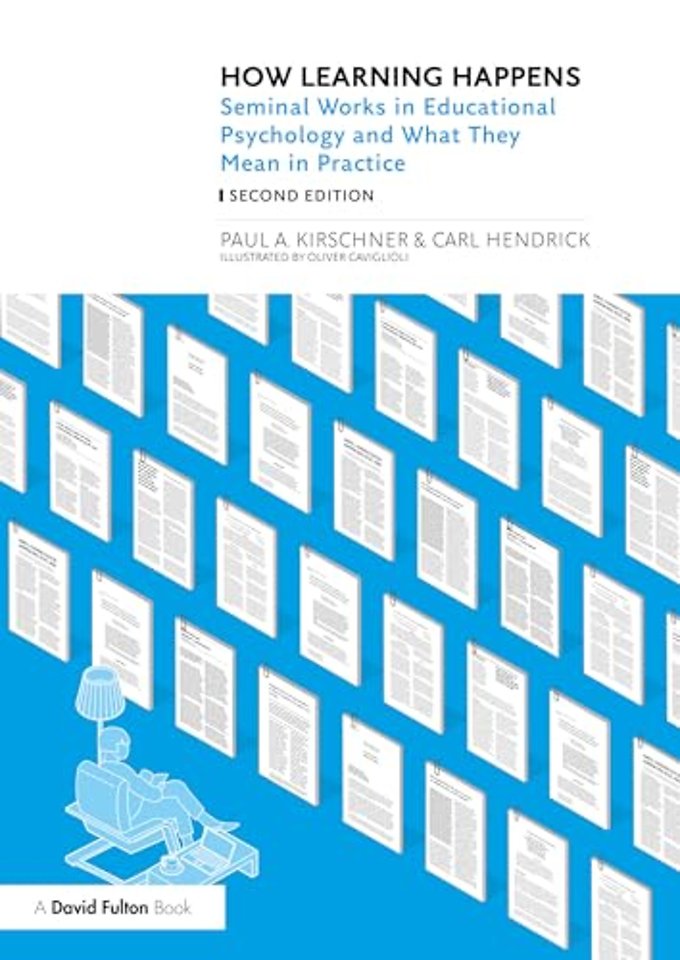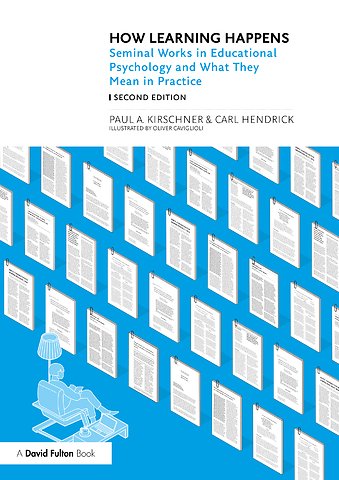


Paul A. Kirschner (1951) is Distinguished University Professor at the Open University of the Netherlands as well as Visiting Professor of Education with a special emphasis on Learning and Interaction in Teacher Education at the University of Oulu, Finland where he was also honored with an Honorary Doctorate (doctor honoris causa).
Meer over de auteursHow Learning Happens
Seminal Works in Educational Psychology and What They Mean in Practice
Paperback Engels 2024 2e druk 9781032498393Samenvatting
'How Learning Happens' introduces 32 giants of educational research and their findings on how we learn and what we need to know to learn effectively, efficiently, and enjoyably. Many of these works have inspired researchers and teachers all around the world and have left a mark on how we teach today.
Now updated to include a new section on Memory and Cognition with five new chapters, this revised second edition explores a selection of the key works on learning and teaching, chosen from the fields of educational psychology and cognitive psychology. It offers a roadmap of the most important discoveries in the way learning happens, with each chapter examining a different work and explaining its significance before describing the research, its implications for practice, and how it can be used in the classroom - including the key takeaways for teachers.
Clearly divided into seven sections, the book covers:
• Memory and cognition
• How the brain works
• Prerequisites for learning
• How learning can be supported
• Teacher activities
• Learning in context
• Cautionary tales
Written by two leading experts and illustrated by Oliver Caviglioli, this is essential reading for teachers wanting to fully engage with and understand educational research as well as undergraduate students in the fields of education, educational psychology and the learning sciences.
Specificaties
Lezersrecensies
Inhoudsopgave
1. Working memory
2. Opening the black box
3. Ah yes, I remember it well
4. "What you know, you know"
5. Do you know what you know? Metacognition
Part 2: How does our brain work?
6. A novice is not a little expert
7. Take a load off me
8. Dancing in the dark
9. An evolutionary view of learning
10. One picture and one thousand words
Part 3: Prerequisites for learning
11. What you know determines what you learn
12. Why independent learning is not a good way to become an independent learner
13. Beliefs about intelligence can affect intelligence
14. … thinking makes it so
15. How you think about achievement is more important than the achievement itself
16. Where are we going and how do we get there?
Part 4: Which learning activities support learning
17. Why scaffolding is not as easy as it looks
18. The holy grail: whole class teaching and one-to-one tutoring
19. Problem-solving: how to find a needle in a haystack
20. Activities that give birth to learning
Part 5: The Teacher
21. Zooming out to zoom in
22. Why discovery learning is a bad way to discover things
23. Direct instruction
24. Assessment for, not of learning
25. Feed up, feedback, feed forward
26. Learning techniques that really work
Part 6: Learning in context
27. Why context is everything
28. The culture of learning
29. Making things visible
30. It takes a community to save $100 million
Part 7: Cautionary tales
31. Did you hear the one about the kinaesthetic learner … ?
32. When teaching kills learning
33. The medium is NOT the message
34. The ten deadly sins of education
35. Lethal mutations: the dirty dozen
Vergelijkbare boeken
Anderen die dit boek kochten, kochten ook
Rubrieken
- advisering
- algemeen management
- coaching en trainen
- communicatie en media
- economie
- financieel management
- inkoop en logistiek
- internet en social media
- it-management / ict
- juridisch
- leiderschap
- marketing
- mens en maatschappij
- non-profit
- ondernemen
- organisatiekunde
- personal finance
- personeelsmanagement
- persoonlijke effectiviteit
- projectmanagement
- psychologie
- reclame en verkoop
- strategisch management
- verandermanagement
- werk en loopbaan











